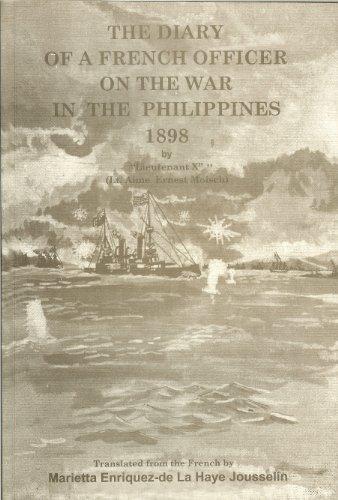The Americans reveal their intentions
Last night, the American military officers and the politicians planned their strategy for eventual takeover.
A new monitor of 4,000 tons, the Monadnoch, dropped anchor after having been at sea for 53 days. News of the peace treaty was conveyed by the consul of the United States in Hongkong. The form of procedure was signed on August 12 and a commission is meeting in Paris for a definitive agreement.
The Americans are already showing their lack of flexibility with regard to the insurgents. In the first place, the officials concerned feel that negotiations should last only a few days. General M.A. ________ allegedly cried out loud, “We have come here to stay. It is not our custom to throw away money for the love of these Negroes. We have spent a considered amount of money which we will recoup by occupying the Philippines. And it would be to the interest of the Filipinos not to run counter to our policies if they wish our support. A blunt statement indeed. Once again the Tagals find themselves on the defensive in their own country.
These Yankees are as clumsy as the most illiterate Englishmen. They insist on regarding the Tagals as Negroes and treating them as such. Using this term is definitely an insult to the Filipinos, but treating them like one is unpardonable. The complacent attitude of the Americans towards the Spaniards is another unreconcilable issue in the eyes of the native. The Anglo-Saxon race believes that human dignity does not extend beyond themselves. A Yankee chatting with Spanish officials in the street smilingly stated, “We will teach these savages a lesson and if these rebels resist, we shall bring them around to reason.”
The Tagals, however, have demonstrated exemplary behavior since the surrender. They have not committed any murder, nor have they attempted to pillage, and yet, their mere presence aggravates the Americans whose cynicism could easily sow the seed of revolt. The Yankees are scandalized that the Filipinos dare contest the government established by the United States army. When General Merritt wanted to keep the Tagals out of Manila and confine them at the Camp in Cavite, he had to order them to do so, because the stubborn natives were reluctant to obey this directive.
The Americans are disarming all the insurgents, including their officers who entered beyond the perimeter assigned to native troops. The Tagals remain stoic and refuse to show their bitter resentment. Every Spaniard employed in whatever capacity in the public sector of Manila has been ordered to leave and has been replaced by an American. There is not a single Filipino among them.
The American troops are occupying the city and the forts of Manila, the arsenal of Cavite, the main points along the road between Manila and Cavite, and control the telegraph service. The fleet is in charge of monitoring communications of the ships at sea.
A visit to the fortified fort at La Loma held by the insurgents could prove to be an interesting experience. In Tondo we were stopped by the American sentinels who searched us for arms and knives, which proves that armed Tagals are not allowed passage, but when I showed them my penknife, they were good-natured about it. At one point we met a number of insurgents wearing hats decorated with a ribbon showing the colors of the republic –red and blue. They were all smiling and greeting us spontaneously. The Tagals are occupying barracks where the road forks. We took a Filipino officer by surprise when we asked him to accompany us to our excursion, but he eventually obliged. Wherever we went we were looked at with great curiosity. In the church of La Loma, where we were warmly welcomed by 10 Spanish artillerymen, we came upon a native officer working at his desk who also showed surprise at our request to permission to walk through the trenches. After questioning us, he finally granted our request and, from that moment, became rather friendly.
Coming from the garden, we met a Filipino colonel on his inspection tour –a young man of about 25 to 30 years old who, in correct French, explained that the Spanish defeat was inevitable. The Spaniards did not represent a formidable adversary to the Tagals who were entirely familiar with their terrain where they could hold their own, or even gain the upper hand, vis-a-vis the Spaniards. Perhaps the Americans were more to be feared. The young colonel had his reservations about the Americans who, he thought, would wish to have complete control over both the Filipinos and the Spaniards. But he hurriedly continued that he hoped the future would prove him wrong. He estimated that the Tagal forces around Manila numbered as many as 10,000 men, with other troops spread out over the islands.
